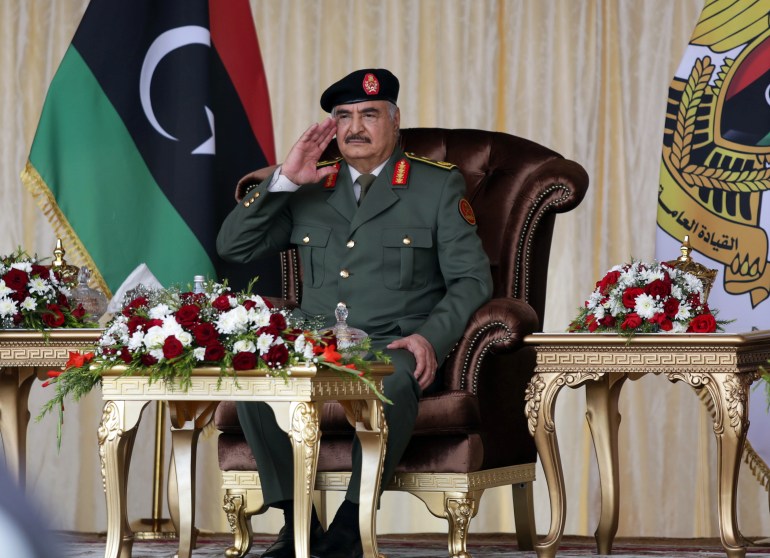The head of the High National Elections Commission in Libya did not rule out postponing the polls, which are supposed to take place late next month, while a military court in the city of Misurata issued a death sentence against retired Major General Khalifa Haftar, days after accepting his candidacy for the presidential elections.
In an exclusive interview with Al Jazeera, as part of the "Best Story" program, the head of the commission, Imad al-Sayeh, said that from the beginning, the commission accepted December 24 as the date for the elections.
But he indicated the possibility of requesting an extension after completing the appeals process.
Al-Sayeh affirmed that the Commission is capable of facing the technical obstacles, but he made it clear that the political obstacles are outside the Commission's control.
The head of the High National Elections Commission in Libya said that they are working in an unstable and abnormal political environment.
He pointed out that the electoral process is not aimed at devolving power, but rather it is a fateful process to unify state institutions.
He also said that securing elections is an original specialty of the Ministry of Interior, and that the ministry is working on developing a plan for that.
Al-Sayeh explained that the commission will be a partner of the ministry in dealing with violations.
The statements of the head of the Electoral Commission in Libya come amid growing doubts that the elections will be held on time, despite international calls to adhere to the December 24 date.
Recently, regions in western Libya witnessed protests against the candidacy of Saif al-Islam Gaddafi and retired Major General Khalifa Haftar, while the Supreme Council of State announced its refusal to hold elections without consensus.
The ruling of the military court in Misurata included Haftar and commanders in his forces (Reuters)
Haftar's death sentence
On the other hand, the permanent military court in the city of Misurata (200 km east of the capital, Tripoli) yesterday issued a death sentence against retired Major General Khalifa Haftar, following the case related to the bombing of the Air College in Misurata in the summer of 2019.
The Military Prosecutor's Office indicated that the ruling is a legal impediment to Haftar's candidacy for the presidential elections.
The ruling of the military court, beside Haftar, included Abd al-Raziq al-Nadori, Saqr al-Jarushi, Abd al-Salam al-Hassi and other leaders of Haftar's forces.
The Military Prosecutor's Office indicated that the ruling against Haftar and the leaders of his forces permanently deprives them of their civil rights, and the court ordered their expulsion from military service.
Earlier, the Military Prosecutor in Libya demanded the implementation of seizure orders against retired Major General Khalifa Haftar, against the background of 5 cases and his violation of the military law, according to local media.
The Military Prosecutor's Office demanded the implementation of the seizure orders issued by the Public Prosecution by the competent judicial officer, in the context of 5 cases for the years 2019 and 2020.
The office stressed the need to restrict the cases to criminal records, without details of those cases.
On violating the military law by running for the presidential elections, the Public Prosecutor's Office said that "Haftar is an officer in the Libyan army and has taken the nomination procedures for the High National Elections Commission."
He added that whoever holds or participates in political meetings, belongs to a political body, participates in demonstrations, unrest, or election campaigns, or writes political articles under an explicit or pseudonym, or delivers political speeches, shall be punished with imprisonment for a period not exceeding 5 years. or incited others to do any of the aforementioned acts.
Saif al-Islam Gaddafi
On the other hand, Khaled al-Zaidi, Saif al-Islam Gaddafi's lawyer, said that gunmen prevented him from submitting an appeal on Thursday against the decision to exclude his client from running in the presidential elections.
Al-Zaidi added that armed men stormed the court in the city of Sabha (southern Libya), which is one of the 3 registration centers for candidates and is under the control of Haftar's forces, and prevented him from entering to file an appeal against his client's decision not to qualify for candidacy.
For his part, the Libyan Interior Minister in the National Unity Government, Khaled Mazen, said that the attack on the headquarters of the Sabha Court of First Instance is an electoral crime, and pledged to prosecute and punish those who participated in it.
Mazen added that the ministry expects such violations to occur, and has prepared a main operations room connected to all electoral offices to ensure the conduct of the election process.
The Libyan Electoral Commission had excluded late Wednesday evening Saif Gaddafi and 24 other candidates out of 98 candidates for the presidential elections, and the exclusion decision is subject to appeal.
And on Wednesday, the Libyan Electoral Commission announced a preliminary list of 73 candidates for the presidential elections scheduled for next December 24, including Haftar, Parliament Speaker Aguila Saleh, and Head of the Government of National Unity Abdel Hamid al-Dabaiba, in addition to another list of 25 excluded, including Saif al-Islam Gaddafi.

